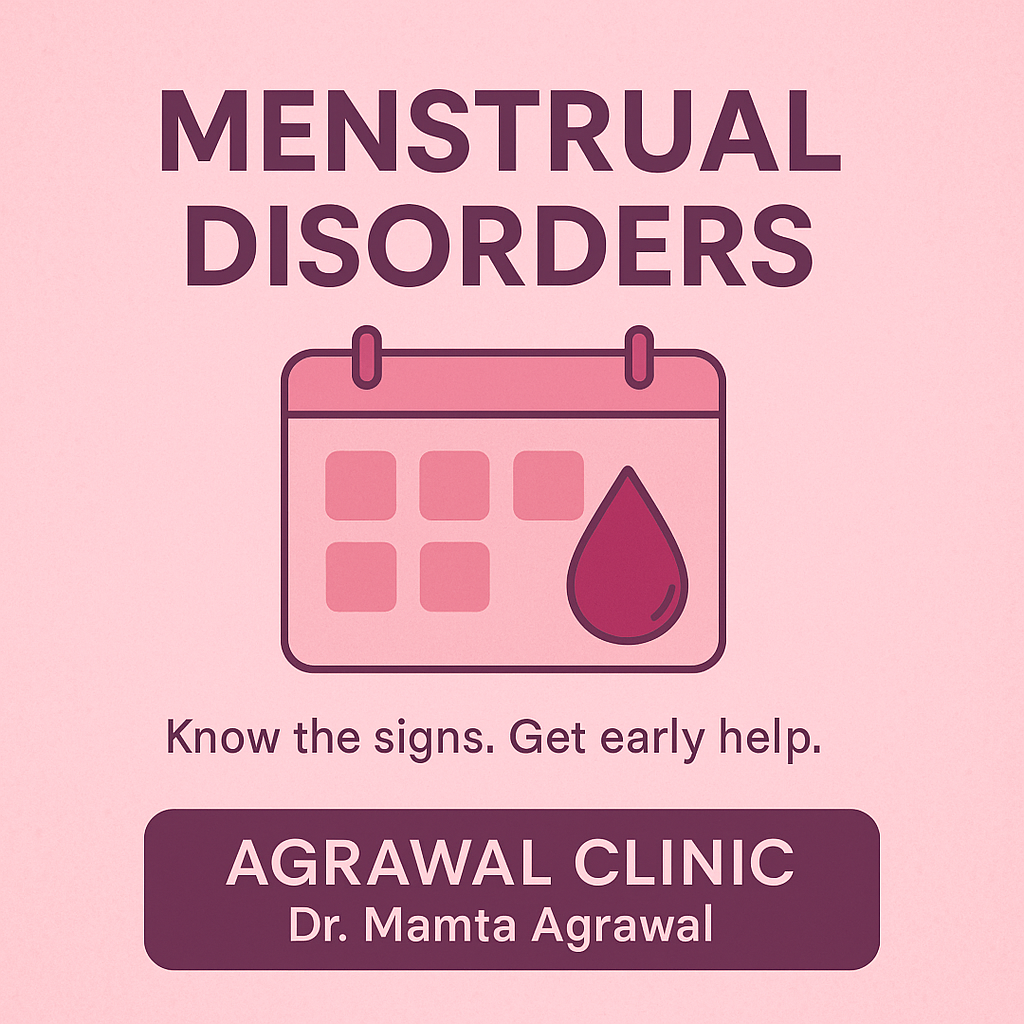A clear guide for women and adolescents — by Dr. Mamta Agrawal, Agrawal Clinic. Call +91 9654365187 to book a consultation.
What are menstrual disorders?
Menstrual disorders are a group of conditions that affect the timing, duration, or amount of menstrual bleeding — and they can significantly affect quality of life. While variations in cycles are common, persistent problems should be evaluated by a gynecologist.

Common types
- Menorrhagia: Heavy or prolonged menstrual bleeding.
- Oligomenorrhea: Infrequent periods (cycles longer than 35 days).
- Polymenorrhea: Frequent periods (cycles shorter than 21 days).
- Amenorrhea: Absence of menstruation (primary or secondary).
- Dysmenorrhea: Painful periods causing cramps and discomfort.
- PMS & PMDD: Mood, physical and behavioral symptoms preceding menses.
Possible causes
Causes vary by age and condition — common causes include:
- Hormonal imbalances (e.g., PCOS, thyroid disorders)
- Uterine causes (fibroids, polyps, adenomyosis)
- Ovulatory dysfunction
- Blood clotting disorders
- Medications (anticoagulants, certain hormonal drugs)
- Stress, extreme weight changes, excessive exercise
- Infections or structural abnormalities
When to seek medical help
Consult a gynecologist if you experience any of the following:
- Very heavy bleeding (soaking through a pad every 1–2 hours)
- Periods lasting longer than 7 days
- Sudden change in cycle pattern
- Severe menstrual pain that affects daily activities
- Missed periods for 3 months (if not pregnant)
- Bleeding between periods or after intercourse
- Symptoms of anemia (fatigue, dizziness, pallor)
How we diagnose
A thorough assessment helps identify the cause. Typical steps include:
- Detailed medical and menstrual history
- Physical and pelvic examination
- Blood tests (CBC, thyroid function, hormones)
- Ultrasound (pelvic / transvaginal) to evaluate uterine or ovarian pathology
- Special tests if needed (hormone panels, coagulation tests, endometrial sampling)
Treatment options
Treatment is tailored to the diagnosis, age, severity and the patient’s desire for future fertility. Options commonly include:
- Medical therapy: Hormonal treatments (combined oral contraceptives, progestins), tranexamic acid for heavy bleeding, NSAIDs for pain, thyroid or other hormone replacement if indicated.
- Minimally invasive procedures: Hysteroscopic polypectomy, endometrial ablation (for selected women who have completed childbearing).
- Surgical options: Myomectomy for symptomatic fibroids or hysterectomy in refractory cases (after full counseling).
- Lifestyle & supportive care: Iron supplementation for anemia, weight management, treating underlying conditions like PCOS or thyroid disease.
Tips for managing symptoms at home
- Keep a menstrual diary or use a cycle-tracking app to record bleeding and symptoms.
- Use heat (hot water bottle) and appropriate pain relief (as advised) for cramps.
- Eat iron-rich foods and follow up on iron supplements if prescribed.
- Maintain a healthy weight, regular gentle exercise and manage stress.
Why early evaluation matters
Early diagnosis prevents complications like anemia, preserves fertility when possible, and treats underlying conditions effectively. Most menstrual disorders are manageable with modern gynecological care.
Book an appointment — Agrawal Clinic
Dr. Mamta Agrawal
Agrawal Clinic, New Ashok Nagar, East Delhi
Phone: +91 9654365187
Email: drmamta2001@gmail.com
Online booking: Click here to book
Confidential, respectful care for adolescents and women of all ages. If you are experiencing heavy bleeding, severe pain, or any concerning symptoms — call us right away.
© Agrawal Clinic. All rights reserved.

